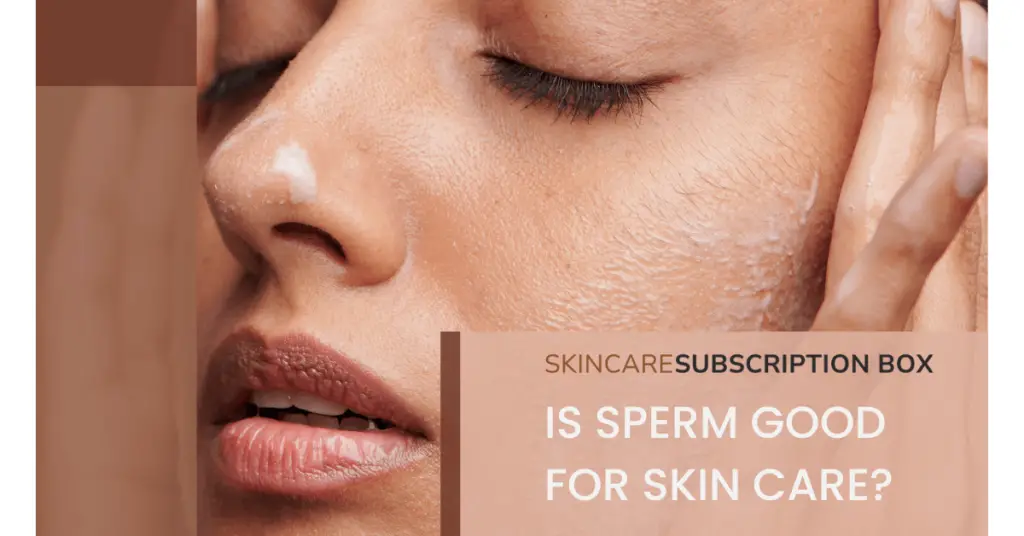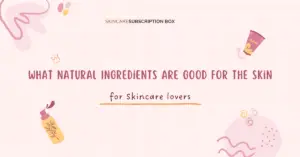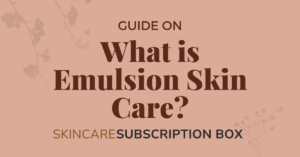
One recent buzz has sent shockwaves through the beauty and skincare industries: is sperm good for skin care? Though this may sound scandalous to some, the reality of the matter may be more complex than meets the eye. Claims attributed to seminal fluid as miraculous skin-transforming agents have generated considerable curiosity. Still, before jumping to conclusions or dismissing this topic as sensationalism, scientists must conduct thorough investigations to uncover scientific facts to distinguish myth from reality.
As we explore this fascinating subject, prepare to be amazed at what modern research has uncovered about sperm’s benefits in skincare. From historical accounts of Cleopatra using seed for its purported rejuvenating properties to cutting-edge studies on its protein content and antioxidant benefits, this topic holds plenty of intrigues! Join us in unraveling its truth as we embark on this fascinating voyage: could sperm hold the key to radiant, youthful skin?
HELPFUL: CAN I GO TO URGENT CARE FOR SKIN PROBLEMS?
Disclaimer: The information on the Skincare Subscription Box should only be taken for informational purposes and used solely as reference material. While we strive to offer accurate and up-to-date advice, skincare industry trends change regularly, and individual skin concerns vary significantly; our recommendations and opinions regarding skincare products and subscription boxes are formed based on extensive research, expert insights, and personal experience. Read full disclaimer here
The Science Behind Sperm and Skincare
The use of sperm in skincare has long been controversial. Some sources assert its benefits due to specific proteins and vitamins, while others claim there’s nothing special about using it beyond regular moisturizer. However, scientific evidence supports its use – Sperm contains spermine, which has antioxidant properties that could potentially reduce wrinkles and fine lines, while its component, Spermidine, promotes cell regeneration and rejuvenation.
Though these findings are intriguing, it’s essential to remember that other skincare products have proven ingredients that offer similar benefits. Research on using sperm for skincare remains limited, and its efficacy remains uncertain compared to existing cosmetic formulations. Furthermore, ethical considerations surrounding its source must be considered when discussing this contentious subject matter. While science shows potential advantages associated with its inclusion into skincare regimes, more rigorous studies must be performed before definitive conclusions can be drawn from them.
DO READ OUT THIS ARTICLE TO HEAR FROM THE PROFESSIONALS: Is Sperm Actually Good for Skin? And 10 Other FAQs
Is sperm good for skin care?
There has been much talk regarding the possible uses of sperm in skincare, with claims that it can improve complexion and reduce signs of aging. While seed may contain protein, zinc, and other essential nutrients that could benefit the skin, its high contamination risk makes this skincare option questionable.
Sperm can raise ethical concerns and may not be suitable for all individuals, as well as scientifically proven alternatives available today. Safety and effectiveness are always best prioritized over sensationalist claims without substance when looking for effective skincare solutions.
Controversies and Misconceptions
Controversies and misconceptions often create widespread misinformation on various subjects, leading to widespread misunderstanding. One such argument is whether sperm can be beneficial for skincare purposes. While some claim it might contain protein content and antioxidant properties, which could provide potential advantages, no scientific data supports these claims, and using sperm can increase risks due to sexually transmitted infections being transmitted during use as a skincare product.
Another common misconception is that natural ingredients are always suitable for skincare products. While natural ingredients may provide many advantages, they can also cause allergic reactions or irritation in specific individuals – it’s, therefore, crucial to carefully evaluate each ingredient’s safety and efficacy rather than solely rely on its natural origins when making decisions regarding our skincare routines and prioritize scientifically supported methods over sensationalized claims. We can make more informed choices by dispelling such myths and misconceptions and prioritizing science over sensationalized claims.
DIY Sperm-based Skincare Products
Though it may sound unconventional, the use of sperm in skincare products has gained increasing attention for its purported advantages. Sperm contains essential nutrients and proteins for skin health, such as zinc, vitamin C, and collagen; experts claim these components help moisturize and rejuvenate the skin for smoother texture and reduce signs of aging.
Concerns surrounding consent, hygiene, and ethical considerations when using sperm for skincare may put individuals off from exploring such products. However, some DIY enthusiasts have taken an alternative route by making homemade cosmetics using seed. While scientific research remains scarce on this trend, those drawn to natural remedies may find this trend fascinating and worth investigating further – however, its effectiveness or popularity among skincare enthusiasts varies considerably.
Expert Opinions and Studies
Expert opinions and studies have provided some intriguing insights into using sperm for skincare purposes. While the idea may sound unconventional, some researchers claim that sperm contains proteins and antioxidants, potentially benefiting the skin. A Journal of Cosmetic Dermatology study published specific components found in seminal fluid that might have antimicrobial properties that help combat acne while improving overall skin health.
Experts speculate that supermini, a compound in sperm, could possess anti-aging properties and aid collagen production. More research needs to be conducted in this area and whether alternative sources can achieve similar results without ethical concerns or potential health risks associated with seed exposure. As studies continue exploring potential skincare benefits associated with sperm exposure, this topic warrants further exploration among beauty and wellness community members.
Ethical and Moral Considerations
Ethical and moral considerations arise when using unconventional products like sperm for skin care. While some may view it as natural and sustainable, others raise valid concerns regarding consent and exploitation. Furthermore, factoring in how this practice commodifies bodily fluids that impact individuals’ autonomy further adds further complexity.
One could also investigate consent’s moral implications since individuals may not understand or approve of how their bodily fluids are utilized. Furthermore, there may be more significant societal concerns regarding the objectification of human body parts and whether such practices contribute to reinforcing negative stereotypes regarding people as mere commodities.
Exploring these ethical dimensions encourages us to consider the immediate repercussions and wider societal ramifications of practices such as beauty products. It requires thinking carefully about our responsibility to respect bodily autonomy while searching for innovative skincare solutions; ultimately, this dialogue leads us closer to an ethical approach toward beauty and personal care.
The Verdict on Sperm Skincare
Recent debates surrounding the use of sperm in skincare have generated both controversy and intrigue. Proponents argue that its high protein content and nourishing properties could benefit skin conditions, while critics point out potential hygiene and ethical concerns. Unfortunately, scientific data regarding this practice is inconclusive, leaving consumers to weigh all available perspectives when deciding whether to use it or not.
Though some may find the idea of using sperm in skincare products offensive or distasteful, it’s essential to remember that there are alternatives readily available without ethical implications or discomfort associated with human bodily fluids – plant-based and synthetic ingredients all offer similar benefits without ethical implications or pain for consumers who choose this route. Furthermore, considering the risk of sexually transmitted diseases or infections from its use highlights an additional necessity of caution when contemplating its usage in products designed for the skin.
As with any beauty trend or remedy, individuals must conduct extensive research and consult dermatologists before incorporating unconventional ingredients such as sperm into their skincare regimens. Although experimenting can be exciting, maintaining an open and cautious attitude is necessary when approaching unorthodox ingredients like this one.





I do not even know the way I stopped up right here, but I believed this put up was good. I do not know who you are but certainly you are going to a well-known blogger in case you are not already 😉 Cheers!
Your point of view caught my eye and was very interesting. Thanks. I have a question for you. https://www.binance.com/ES_la/register?ref=T7KCZASX
Very interesting subject, regards for putting up.